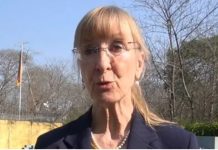ISLAMABAD: Prime Minister Shehbaz Sharif on Wednesday announced major reforms as the federal cabinet approved two landmark initiatives — the National Artificial Intelligence (AI) Policy 2025 and Hajj Policy 2026 — during a high-level meeting in Islamabad.
The cabinet unanimously endorsed the AI policy aimed at developing a full-fledged AI ecosystem across Pakistan, with ambitious targets including training one million AI professionals by 2030 and producing 1,000 indigenous AI products within five years.
It also includes launching 50,000 civic projects, offering 3,000 annual scholarships, and facilitating 1,000 research projects.
“Our youth are Pakistan’s greatest asset. Providing them with education, skills, and equal opportunities in AI is a top priority,” said PM Shehbaz.
The policy promises inclusive education and financing for women and differently-abled persons, ensures national cybersecurity, and aligns local standards with global AI regulations.
A designated AI Council, supported by a Master Plan and Action Matrix, will supervise implementation. The government also plans to create AI Innovation and Venture Funds to encourage private sector involvement.
PM Shehbaz praised the Ministry of IT and related departments for their timely contributions. “AI will not only modernise our economy but also enhance productivity across agriculture, public services, and governance,” he stated.
Hajj updates
Separately, the Cabinet approved Hajj Policy 2026, which mandates full digitisation of the pilgrimage process, starting in 2026.
70% of pilgrims will be accommodated under the government scheme, while 30% will go through private operators, who will now undergo stricter accountability.
Private Hajj companies that failed to deliver in the previous year must facilitate the same pilgrims in 2026.
Real-time tracking, digital wristbands, mobile apps, SIM cards, and a revamped compensation mechanism are among key improvements.
The Ministry of IT will work jointly with the Ministry of Religious Affairs to ensure the digital transformation of the Hajj operations.
Federal Minister for Religious Affairs, Sardar Muhammad Yousaf addressed key developments and policy decisions regarding Hajj arrangements while speaking to the media.
He stated that the Ministry of Religious Affairs will formally respond to the Senate Standing Committee’s sub-committee regarding its recent report on Hajj operations. He criticised that the sub-committee did not take the ministry into confidence while preparing its report.
He acknowledged the failure of some private Hajj tour operators to deposit pilgrims’ payments on time, which resulted in complications last year.
To remedy this, private tour operators will now offer Hajj to affected pilgrims based on last year’s costs.
He added that a financial eligibility criterion has been introduced for private operators to ensure transparency, and that monitoring of both public and private Hajj schemes will be conducted by a neutral third party.
The Hajj selection process will now follow a first-come, first-served basis, and only pilgrims with Saudi-approved vaccinations will be allowed.
The “Road to Makkah” facility will be available at Islamabad and Karachi airports.
Additionally, the ministry will provide full training to pilgrims and establish emergency response teams. An effective financial oversight system and a transparent grievance redressal mechanism will also be implemented.
Furthermore, the Hajj Nazim Scheme will continue, and children under 12 years of age will not be allowed to perform Hajj.
Yousaf also confirmed that the ministry has aligned its Hajj policy with Saudi Arabia’s timeline, and implementation will begin from August 4.

















